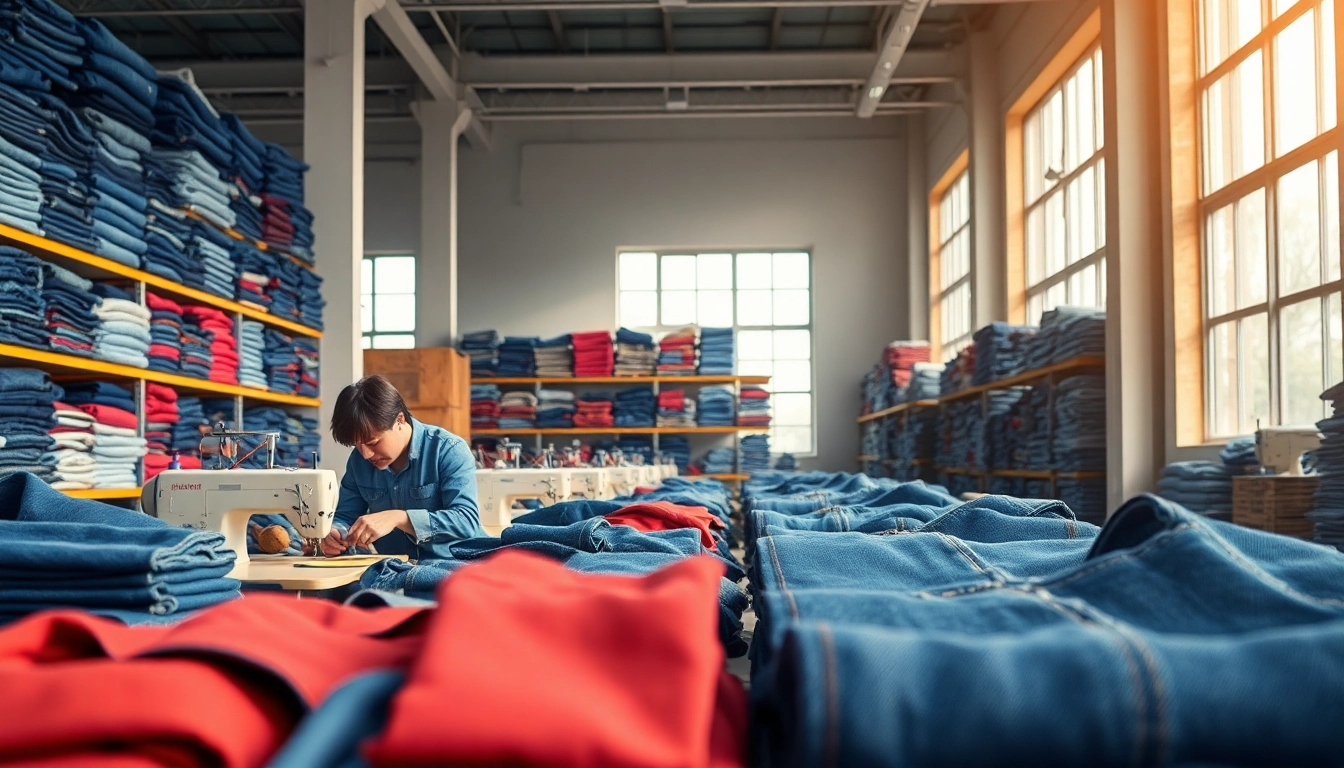Understanding the Impact of Jeans Cloth Manufacturers on Fashion Trends
The Role of Jeans Cloth Manufacturers in the Fashion Industry
In the contemporary fashion landscape, jeans remain an evergreen staple adored by consumers worldwide. This ubiquity emphasizes the crucial role of jeans cloth manufacturers who not only produce these garments but also influence trends, uphold sustainability, and navigate complex supply chains. Understanding their contribution and the nuances of denim production is essential for brands and consumers alike.
Understanding the Denim Supply Chain
The denim supply chain is a multifaceted ecosystem involving various stages from raw material sourcing to finished product delivery. It begins with the cultivation of cotton, which is then processed into denim fabric. Manufacturers play a pivotal role in this process by selecting quality cotton and utilizing advanced techniques to transform it into durable denim.
Once produced, denim fabric undergoes various stages, including dyeing, weaving, and finishing, before reaching brands and consumers. Each phase contributes to the overall quality and aesthetic of the final product, underscoring the importance of collaboration among different stakeholders in ensuring excellence. Transparency within this supply chain also becomes paramount as consumers increasingly seek brands that prioritize ethical sourcing and sustainable practices.
Key Players in Jeans Production
Within the world of jeans manufacturing, several key players form the backbone of production:
- Cotton Farmers: The primary suppliers of raw materials, these farmers cultivate the essential cotton used for fabric production.
- Spinners: Responsible for converting raw cotton into yarn, spinners set the foundation for quality in subsequent stages.
- Weavers: They play a crucial role in creating various types of denim fabrics through intricate weaving techniques.
- Finishing Houses: These entities apply treatments to denim to enhance durability, color, and texture, oftentimes integrating sustainable practices.
- Brands & Retailers: Finally, companies that market and sell denim products influence design trends and consumer preferences significantly.
Trend Analysis and Market Insights
The jeans market is characterized by constant evolution and shifting consumer demands. Recent years have witnessed a surge in preferences for sustainable and ethically produced denim, driven by consumer awareness around environmental impacts. Market insights indicate that brands focusing on eco-friendly practices, such as sustainable cotton sourcing and low-impact dyeing techniques, resonate well with today’s conscious consumers.
Moreover, aesthetic trends, including high-waisted fits, distressed finishes, and innovative cuts, dictate the production focus within the industry. A comprehensive understanding of these trends enables jeans cloth manufacturers to align their offerings with market demands effectively, ensuring competitiveness and relevance.
Sourcing Quality Denim Fabrics
Factors to Consider When Choosing Suppliers
Selecting the right supplier is pivotal for ensuring high-quality denim production. Factors to consider include:
- Fabric Quality: Prospective manufacturers should offer samples to assess fabric strength, texture, and dye consistency.
- Reputation and Reliability: Researching supplier history and market stance aids in understanding their track record and reliability.
- Ethical Practices: Verifying adherence to labor laws, environmental protections, and sustainability certifications is essential.
- Capacity and Scalability: Choosing suppliers capable of meeting production demands efficiently allows for growth without compromising quality.
- Technological Advancements: Suppliers leveraging modern technology in production may provide superior products and enhanced efficiency.
Evaluating Fabric Quality and Sustainability
As the demand for sustainable fashion grows, the evaluation of fabric quality and environmental impact has gained prominence. Key considerations include:
- Material Composition: Fabrics made from organic cotton or recycled materials typically boast lower environmental footprints.
- Certifications: Look for sustainable certifications like GOTS (Global Organic Textile Standard) that indicate responsible manufacturing practices.
- Production Methods: Assessing manufacturing processes to ensure minimal water usage and reduced chemical dependency is crucial for sustainability.
- Lifecycle Impact: Understanding how fabric behaves through wear, washing, and disposal can inform choices about durability and longevity.
Global Sourcing vs. Local Suppliers
The debate between global sourcing and local suppliers heavily influences the denim industry. Global sourcing often provides access to a broader range of materials, technologies, and competitive pricing. However, it can also involve longer lead times and potential transparency issues. On the other hand, local suppliers can enhance brand storytelling through community support and quicker adaptation to market changes.
Brands must weigh the benefits of cost-effective global options against the ethical and logistical advantages of supporting local manufacturers, carefully aligning their sourcing strategies with their brand values and consumer preferences.
Technological Advancements in Denim Manufacturing
Innovations Enhancing Production Efficiency
Technological innovation is a driving force behind modern denim manufacturing, revolutionizing production processes and improving efficiency. Automation of processes such as cutting and sewing has streamlined operations, allowing manufacturers to meet increasing demand while maintaining quality. 3D printing technology is another area showing promise, offering customization and rapid prototyping capabilities.
Advanced data analytics can further enhance supply chain efficiency by forecasting demand and optimizing inventory levels. Additionally, implementing AI in design and production can lead to faster turnaround times and innovative patterns, catering to the ever-evolving tastes of consumers.
Sustainable Practices in Fabric Production
With environmental issues at the forefront of contemporary discussions, sustainable practices are increasingly integral to denim fabric production. Techniques such as waterless dyeing processes and the use of eco-friendly chemicals are reshaping manufacturing standards. Moreover, many manufacturers are embracing circular fashion principles, creating fabrics from recycled denim to minimize waste and reduce reliance on virgin resources.
By focusing on sustainability, manufacturers not only comply with regulations but also cater to a market that prioritizes eco-conscious products, thereby enhancing brand loyalty and trust among consumers.
Future Trends in Denim Manufacturing Technology
The future of denim manufacturing is poised for groundbreaking advancements. Emerging technologies such as augmented reality (AR) are expected to transform how consumers engage with products. Brands can use AR to create virtual fitting rooms, improving the shopping experience and reducing return rates.
Furthermore, advancements in biotechnology may lead to smarter fibers that adapt to the wearer’s needs, combining durability with enhanced comfort. As these technologies evolve, the competitive landscape will shift, making it imperative for brands to stay ahead of trends and adapt continually.
Collaborating with Jeans Cloth Manufacturers
Building Strong Supplier Relationships
Establishing robust relationships with jeans cloth manufacturers is fundamental for brands aiming for success in the denim industry. Regular communication, transparent feedback, and collaborative problem-solving are essential strategies for fostering these partnerships. Brands should invest time in understanding their suppliers’ challenges and capabilities to build trust and enhance collaboration.
Engaging in joint marketing efforts and sharing future plans can create a sense of partnership, motivating manufacturers to prioritize brands with whom they feel connected. This collaboration can lead to innovative product offerings and more streamlined operations, ultimately benefiting both parties.
Negotiating Contracts and Pricing Strategies
Effective negotiation is key to structuring beneficial agreements with suppliers. Brands should aim for fair pricing that reflects the quality and sustainability of materials while also considering long-term partnerships over short-term cost savings. Establishing clear terms regarding quality standards, delivery timelines, and payment schedules will help avoid disputes and ensure smooth transactions.
Brands can leverage market data to negotiate effectively, emphasizing value creation rather than merely focusing on price. Furthermore, incorporating clauses for sustainability and ethical practices within contracts can safeguard brand values while aligning mutually beneficial goals.
Designing Custom Jeans with Manufacturers
One of the greatest advantages of collaboration between denim brands and manufacturers is the opportunity for customization. Brands seeking to differentiate themselves in a saturated market can work closely with manufacturers to design unique products tailored to specific consumer insights. This collaboration extends to selecting fabric types, finishes, and fits, allowing brands to articulate their identity distinctively.
Utilizing technology such as 3D design tools can streamline the prototyping process, enabling brands to visualize styles before production. Closer collaboration during the design phase not only enhances the creativity involved but also improves the likelihood of bringing successful products to market.
Marketing Your Brand with Denim Products
Leveraging Social Media for Brand Growth
In the digital age, social media has become an indispensable tool for marketing denim products. Brands can utilize platforms such as Instagram and TikTok to showcase their offerings through visually engaging content, fostering a deeper connection with consumers. Building a cohesive brand aesthetic while strategically using user-generated content can significantly enhance visibility and authenticity.
Engaging directly with followers through chats and comments creates a community-centered approach, allowing consumers to feel a part of the brand narrative. Influencer partnerships may also prove beneficial by tapping into established audiences and further expanding reach.
Effective Storytelling in Denim Marketing
Successful marketing extends beyond product promotion; it encompasses storytelling that resonates with consumers. Brands must communicate their values, heritage, and commitment to quality while aligning these narratives with consumer aspirations. Whether promoting sustainable practices or distinctive craftsmanship, stories that evoke emotion will resonate more strongly with consumers.
Examples could include the journey of denim from farm to finished product, highlighting sustainable farming techniques, or celebrating the artisans behind each garment. These narratives not only create brand loyalty but also foster a community of advocates for the brand’s values and mission.
Case Studies of Successful Denim Brands
Examining case studies of successful denim brands reveals valuable insights into effective marketing practices. These brands often highlight their unique selling propositions, cultivate strong connections with their audience, and showcase their commitment to social and environmental causes. The stories of hardship, innovation, and victory reviewed through these case studies can serve as a guide for other brands navigating the competitive landscape of denim fashion.
Learning from successful campaigns that identified key consumer trends, collaborated with influential figures, and established strong emotional connections can empower emerging brands to carve their niche effectively in the denim marketplace.














Post Comment